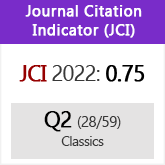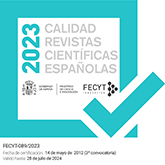Mecanismos de ficcionalización en la vida de Aristipo de Cirene
DOI:
https://doi.org/10.3989/emerita.2022.05.2146Palabras clave:
Aristipo de Cirene, biografía de filósofos griegos, Diógenes Laercio, catálogos, biografía y comedia, retórica antiguaResumen
En el primer capítulo del influyente libro The Content and the Form. Narrative Discourse and Historical Representation (Baltimore & London 1987), Hayden White plantea que ni siquiera el formato historiográfico mínimo de la crónica y del catálogo le permite escapar de la formulación literaria que todo relato conlleva. En este estudio pretendemos demostrar que, en algunos casos, el catálogo puede incluso vertebrar los mecanismos de construcción de la ficción literaria en un relato historiográfico, particularmente en el subgénero particular de la biografía filosófica. Para ello, tomaremos como caso de estudio la Vida de Aristipo de Cirene, fundamentalmente en las Vidas y doctrinas de los filósofos ilustres de Diógenes Laercio (II 65-85): una buena parte de los apartados de su biografía responde a diversos títulos del catálogo de sus obras, precisamente aquellos de cuyo contenido poco o nada conocemos. Si añadimos a este estado de cosas que Aristipo es un personaje estereotipado de la Comedia Media, creemos que resulta posible establecer con claridad los mecanismos de ficcionalizazión literaria que operan en la narración de esta peculiar biografía.
Descargas
Citas
Angeli, A. (1988): Filodemo. Agli amici di Scuola (P.Herc. 1005), Nápoles.
Annas, J. (1993): The Morality of Happiness, Oxford.
Antoniades, E. (1916): Aristipp und die Kyrenaiker, Tesis Doctoral, Gotinga, Universität Göttingen.
Arnott, W. G. (1996): Alexis. The Fragments. A Commentary, Cambridge.
Arrighetti, G. (1987): Poeti, eruditi e biografi. Momenti della riflessione dei Greci sulla letteratura, Pisa.
Bell, J. M. (1978): «Simonides in the Anecdotal Tradition», Quaderni Urbinati di Cultura Classica 28, pp. 29-86. https://doi.org/10.2307/20537863
Bredlow, L.-A. (2007): «Some Notes on Diogenes Laertius», Hermes 135, pp. 370-372. https://doi.org/10.25162/hermes-2007-0035
Brisson, L. (1993): «Les accusations de plagiat lancées contre Platon», en Dixsaut, M. (ed.), Contre Platon I. Le Platonisme dévoilé, París, pp. 339-356.
Bromberg, J. A. (2018): «A Sage on the Stage: Socrates and Athenian Old Comedy», en Stavru, A. y Moore, Ch. (eds.), Socrates and the Socratic Dialogue, Leiden- Boston, pp. 31-63. https://doi.org/10.1163/9789004341227_003
Classen, J. (1958): «Aristippos», Hermes 86, pp. 182-192. https://doi.org/10.1038/182086d0
Cribiore, R. (2001): Gymnastics of the Mind. Greek Education in Hellenistic and Roman Egypt, Princeton. https://doi.org/10.1515/9781400844418
Crönert, W. (1905): Kolotes und Menedemos. Texte und Untersuchungen zur Philosophen- und Literaturgeschichte, Leipzig [reimpr. Ámsterdam 1965].
De Temmerman, K. (2016): «Ancient Biography and Formalities of Fiction», en De Temmerman, K. y Demoen, K. (eds.), Writing Biography in Greece and Rome. Narrative Technique and Fictionalization, Cambridge, pp. 3-25. https://doi.org/10.1017/CBO9781316422861.002
De Temmerman, K. & Demoen, K. (eds.) (2016): Writing Biography in Greece and Rome. Narrative Technique and Fictionalization, Cambridge. https://doi.org/10.1017/CBO9781316422861
De Vogel, C. J. (1961): «What philosophy meant to the Greeks?», International Philosophical Quarterly 1, pp. 35-57. https://doi.org/10.5840/ipq19611117
Dorandi, T. (2007): «Il Περὶ παλαιᾶς τρυφῆς attribuito a Aristippo nella storia della biografia antica», en Erler, M. y Schorn, St. (eds.), Die griechische Biographie in Hellenistischer Zeit, Berlín, pp. 157-172. https://doi.org/10.1515/9783110901238.157
Dorandi, T. (2018): «Socrates in the Ancient Biographical Tradition. From the anonymous PHib. 182 to Diogenes Laertius», en Stavru, A. y Moore, Ch. (eds.), Socrates and the Socratic Dialogue, Leiden-Boston, pp. 787-798. https://doi.org/10.1163/9789004341227_039
Döring, K. (1988): Der Sokratesschüler Aristipp und die Kyrenaiker, Stuttgart.
Döring, K. (1998): «Aristipp aus Kyrene und sein gleichnamiger Enkel», en Flashar, H. (ed.), Grundriss der Geschichte der Philosophie. Die Philosophie der Antike, Band 2/1, Basilea, pp. 246-257.
Dudley, D. R. (1937): A History of Cynicism. From Diogenes to the 6th Century A.D., Londres.
Erbì, M. (2020): Epicuro. Lettere. Frammenti e testimonianze, Pisa-Roma.
Fairweather, J. (1974): «Fiction in the Biographies of Ancient Writers», Ancient Society 5, pp. 231-275.
Fairweather, J. (1983): «Traditional Narratives, Influence and Truth in the Lives of the Greek Poets», Papers of the Liverpool Latin Seminar 4, pp. 315-369.
Farmer, M. C. (2017): «Playing the Philosopher: Plato in Fourth-Century Comedy», American Journal of Philology 138, pp. 1-41. https://doi.org/10.1353/ajp.2017.0000
Fuentes González, P.-P. (2019): «La prétendue "diatribe" antique, fantôme ou instrument Grau, S. (2009): «Come parlavano i filosofi? Analisi delle forme espressive dei filosofi greci nella biografia antica», Lexis 27, pp. 405-446.
Grau, S. (2010): «Tipificación en la biografía griega antigua de filósofos: la construcción de una imagen preconcebida», Espíritu 140, pp. 435-492.
Hadot, P. (1995): Qu'est-ce que la philosophie antique?, París.
Helm, R. (1906): Lucian und Menipp, Leipzig-Berlín.
Hirzel, R. (1895): Der Dialog, I, Leipzig 1895.
Hock, R. F. & O'Neill, E. N. (1986): The Chreia in Ancient Rhetoric: Vol. I. The Progymnasmata, Atlanta.
Hourcade, A. (2008): «Aristippe de Cyrène, la sagesse, le plaisir et l'argent», en Rossetti, L. y Stavru, A. (eds.), Socratica 2005: studi sulla letteratura socratica antica presentati alle Giornate di studio di Senigallia, Bari, pp. 215-233.
Imperio, O. (1998): «La figura dell'intellettuale nella commedia greca», en Belardinelli, A. M. et al. (eds.), Tessere. Frammenti della commedia greca: studi e commenti, Bari, pp. 43-130.
Jacobs, A. (2016): S. Epiphanius of Cyprus: A Cultural Biography of Late Antiquity, Oakland. https://doi.org/10.1525/california/9780520291126.001.0001
Júnior, A. (1989): «Importância da cria na cultura helenistica», Euphrosyne 17, pp. 31-62. https://doi.org/10.1484/J.EUPHR.5.126554
Kahn, C. H. (1996): Plato and the Socratic Dialogue. The philosophical use of a literary form, Cambridge. https://doi.org/10.1017/CBO9780511585579
Kindstrand, J. F. (1986): «Diogenes Laertius and the Chreia Tradition», Elenchos 7, pp. 217-243.
Kivilo, M. (2010): Early Greek Poets' Lives: the Shaping of the Tradition, Leiden-Boston. https://doi.org/10.1163/ej.9789004186156.i-272
Lampe, K. (2015): The Birth of Hedonism. The Cyrenaic Philosophers and Pleasures as a Way of Life, Nueva Jersey. https://doi.org/10.23943/princeton/9780691161136.001.0001
Lefkowitz, M. R. (1981): The Lives of the Greek Poets, Baltimore.
Lefkowitz, M. R. (2009): «Biographical Mythology», en Dill, U. y Walde, Ch. (eds.), Antike Mythen: Medien, Transformationen, und Konstruktionen (Studien in Honorem Fritz Graf), Berlín, pp. 516-531. https://doi.org/10.1515/9783110217247.6.516
Luzzatto, M. T. (2004): «L'impiego della "chreia" filosofica nell'educazione antica», en Funghi, M. S. (ed.), Aspetti di letteratura gnomica nel mondo antico, vol. II, Florencia, pp. 157-187.
Mann, W.-R. (1996): «The life of Aristippus», Archiv für Geschichte der Philosophie 78, pp. 97-119. https://doi.org/10.1515/agph.1996.78.2.97
Mannebach, E. (1961): Aristippi et Cyrenaicorum fragmenta, Leiden-Colonia.
McCarty, W. (1989): «The Shape of the Mirror: Metaphorical Catoptrics in Classical Literature», Arethusa 22, pp. 161-195.
herméneutique?», en Favreau-Linder, A.-M. y De Giorgio, J.-P. (eds.), La diatribe antique. Enquête sur les formes dialogiques du discours philosophique, Limoges, pp. 21-41.
Giannantoni, G. (1958): I Cirenaici, Florencia.
Giannantoni, G. (1990): Socratis et Socraticorum Reliquiae, IV A, Nápoles.
Giannattasio Andria, R. (1989): I frammenti delle «Successioni dei filosofi», Nápoles.
Gomperz, Th. (1893): Griechishe Denker, Leipzig.
Gouirand, P. (2005): Aristippe de Cyrène, le chien royal: une morale du plaisir et de la liberté, París.
Goulet-Cazé, M.-O. (ed.) (1999): Diogène Laërce. Vies et doctrines des philosophes illustres, París.
Goulet, R. (1994): «Diocles de Magnésie», DPhA II D 115, pp. 775-777.
Morgan, T. (1998): Literate Education in the Hellenistic and Roman Worlds, Cambridge.
Natorp, P. (1885): «Aristippos» 8, RE II 1, col. 902-906.
Nesselrath, H.-G. (1985): Lukians Parasitendialog: Untersuchungen und Kommentar, Berlín.
Nesselrath, H.-G. (1990): Die attische Mittlere Komödie, Berlín-Nueva York. https://doi.org/10.1515/9783110888997
Nestle, W. (1922): Die Sokratiker in Auswahl, Jena.
Nietzsche, F. (1869): «De Laertii Diogenis fontibus», Rheinisches Museum 24, pp. 181-228.
Patzer, A. (1994): «Sokrates in den Fragmenten der Attischen Komödie», en Bierl, A. y Mollendorf, P. V. (eds.), Orchestra. Drama, Mythos, Buhne. Festschrift für H. Flashar, Stuttgart-Leipzig, pp. 50-81. https://doi.org/10.1007/978-3-663-12276-0_5
Römer, C. E. (2021): «Gnomological text and chreia of Diogenes of Sinope», en Bastianini, G., Maltomini, F., Manetti, Minutoli, D. y Pintaudi. R. (eds.), 'E me l'ovrare appaga'. Papiri e saggi in onore di Gabriella Messeri (P.Messeri),v Firenze, pp. 63-67.
Rossetti, L. (2011): Le dialogue socratique, París.
Schorn, S. (2007): «Chamaileon: Biographie und Schriften Περὶ τοῦ δεῖνα», Studi classici e orientali 57, pp. 31-65.
Schorn, S. (2008): «Chamaileon-Studien», en Geus, K., Herrmann, K., Fehn, U. y Porsch, E. (eds.), Dona sunt pulcherrima. Festschrift für Rudolf Rieks, Oberhaid, pp. 51-81.
Stavru, A. & Moore, C. (2018): Socrates and the Socratic Dialogue, Leiden-Boston.. https://doi.org/10.1163/9789004341227
PMid:28779209
Susemihl, F. (1881): Geschichte der griechischen Litteratur in der Alexandrinerzeit I, Leipzig.
Tsouna-McKirahan, V. (1994): «The Socratic Origins of the Cynics and Cyrenaics», en Vander Waerdt, P. A. (ed.), The Socratic Movement, Ithaca, pp. 367-391.
Urstad, K. (2018): «Aristippus on Freedom, Autonomy, and the Pleasurable Life», en Stavru, A. y Moore, Ch. (eds.), Socrates and the Socratic Dialogue, Leiden- Boston, pp. 179-201. https://doi.org/10.1163/9789004341227_010
von Arnim, H. (1895): «Aristippos» 10, RE II 1, col. 906.
von Arnim, H. (1898): Leben und Werke des Dio von Prusa, Berlín.
Wehrli, F. (1973): «Gnome, Anekdote und Biographie», Museum Helveticum 30, pp. 193-208.
Weiher, A. (1913): Philosophen und Philosophenspott in der attischen Komödie, Tesis Doctoral, Múnich, Universität München.
White, H. (1987): The Content and the Form. Narrative Discourse and Historical Representation, Baltimore-Londres.
Wilamowitz-Moellendorff, U. von (1881): Antigonos von Karystos, Berlín.
Wissmann, J. (2014): «Education», en Claus, J. J. y Cuypers, M. (eds.), A companion to Hellenistic Literature, Sussex, pp. 62-77. https://doi.org/10.1002/9781118970577.ch5
Ypsilanti, M. (2006): «Lais and Her Mirror», BICS 49, pp. 193-213. https://doi.org/10.1111/j.2041-5370.2006.tb00684.x
Zeller, E. (1922): Die Philosophie der Griechen II 1, Leipzig.
Zilioli, U. (2014): The Cyrenaics. Pleasure and Happiness, Nueva York. https://doi.org/10.4324/9781315729459
Descargas
Publicado
Cómo citar
Número
Sección
Licencia
Derechos de autor 2022 Consejo Superior de Investigaciones Científicas (CSIC)

Esta obra está bajo una licencia internacional Creative Commons Atribución 4.0.
© CSIC. Los originales publicados en las ediciones impresa y electrónica de esta Revista son propiedad del Consejo Superior de Investigaciones Científicas, siendo necesario citar la procedencia en cualquier reproducción parcial o total.Salvo indicación contraria, todos los contenidos de la edición electrónica se distribuyen bajo una licencia de uso y distribución “Creative Commons Reconocimiento 4.0 Internacional ” (CC BY 4.0). Puede consultar desde aquí la versión informativa y el texto legal de la licencia. Esta circunstancia ha de hacerse constar expresamente de esta forma cuando sea necesario.
No se autoriza el depósito en repositorios, páginas web personales o similares de cualquier otra versión distinta a la publicada por el editor.
Datos de los fondos
Ministerio de Ciencia, Innovación y Universidades
Números de la subvención PID2019-110908GB-I00














